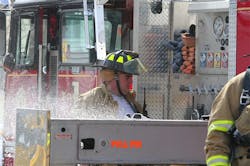Apparatus Operators Do More Than Drive The Rig
What does it take to be a good engine or truck company operator? A lot more than just getting the apparatus to the scene in one piece, says Allen Baldwin, chief of the Winchester, Va., Fire Department.
Baldwin presented a class titled “Engine Company and Truck Company Chauffeur/Operator” at Firehouse Expo in Baltimore recently and outline what is expected of the individuals who are asked to fill one of the most important positions on the fireground.
“How do you select your operators,” Baldwin asked the classroom packed with firefighters and officers from around the nation. “Is it based on age, abilities, popularity, experience, or is it in the bloodline and gene pool?”
While all of those points might be factors in the decision making process, they should also be bolstered by training, Baldwin said.
“Is getting the apparatus to the scene enough to be an operator,” Baldwin asked. In most cases, being a good, qualified truck or engine company operator requires a lot more than the ability to drive the apparatus.
In all cases, being able to place the apparatus appropriately and having a knowledge of fireground operations should be basic requirements for apparatus operators and being a certified pump operator would be a good idea as well, Baldwin said.
With many departments, the apparatus operator is part of the “two in, two out” requirement so being a certified firefighter is also more than a good idea, Baldwin said.
Baldwin said to be an apparatus operator, the individual must have reading, communications, mathematic, and mechanical skills as well as some basic supervisory skills.
In many cases, Baldwin said the apparatus operator often has some command and control responsibilities.
“Often when a chief arrives on the scene, the first person he talks to is the apparatus operator,” Baldwin said, noting that’s why it is important the individual have some aptitude for command and control.
Being in good physical condition is also an important attribute for an apparatus operator, Baldwin said, adding that good vision and hearing are important as well.
“The apparatus operator position is not a job for retirees anymore,” Baldwin said.
Apparatus operators should know their apparatus better than anyone on the department, Baldwin said. A good operator knows where all the equipment is on the rig and doesn’t “go opening and slamming every compartment on the truck trying to find something like the rest of us.”
The operator should also know the community in which they serve extremely well, Baldwin said.
“It would be better to know that you can make that corner rather than trying it and finding out you can’t when you are responding to a call,” Baldwin said. “It’s always better to know that if you need to get someplace in a hurry that you go two blocks up and turn left and then in, rather than trying to go direct.”
A good operator not only knows his jurisdiction, he knows his apparatus and keeps it ready to go at all times, Baldwin said. That means the seat and the mirrors are adjust for his requirement before responding and, if he’s a truck operator, he knows the jack spread on the aerial and knows where it can be placed and operated safely.
“A good operator can make or break your operations,” Baldwin said. “They may be the ones who save your butts, so get the best ones you can find, ones you trust.”
